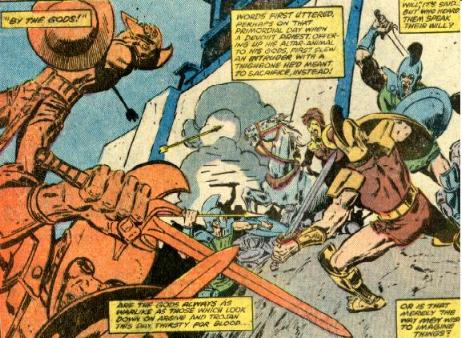
THE TROJAN WAR

Timeline/Dimension: Earth-616, 1193-1183 B.C.
Instigators: Discord, Paris, and Venus
Purpose: To release Troy's control over the Hellespont, a waterway leading east to Colchis, and the return of Helen to Sparta
Allies: The forces of the Greeks: Achilles, Agamemnon, Ajax the Greater, Ajax the Lesser, Calchas,
Diomedes, Machaon, Menelaus,
Myrmidons, Nestor,
Odysseus, Patroclus, Phoenix, Sinon, Teucer
Their allies: Athena,
Hephaestus,
Hera, Hermes, Neptune, Thetis
Opposition: The forces of Troy: Aeneas, Andromache,
Antenor, Cassandra, Deiphobus, Glaucus, Hecuba,
Hector, Helenus, Lycaon, Pandarus,
Paris, Penthesilia, Polydorus, King
Priam, Rhesus, Sarpedon
Their allies: Apollo,
Ares, Artemis,
Leto, Scamander, Venus
Location: Troy and the Dardanian Plain (now part of modern Turkey),
First Appearance: Thor Annual#8 (November, 1979)
History: (Greek Legend, c. 1193-1183 BC)- At the wedding of King Peleus of Phthia to the sea-goddess Thetis, Eris (later to be known as Bellona) the goddess of Discord, became angry that she had not been invited to the ceremony and stole a apple from the Garden of the Hesperides owned by Hera, Queen of the Olympian Gods. She inscribed on it, "To the fairest," and tossed it into the ceremony to create fervor among the guests. The goddesses Hera, Athena and Venus each tried to claim it on their own behalf, and when they could not come to a decision, they bequeathed Zeus, Lord of the Olympian Gods to decide. Refusing to become involved, he directed Hermes, the messenger god, to choose a mortal to settle the decision. Hermes chose the exiled Trojan prince Paris to arbitrate. In a dream, Hera offered Paris power over a kingdom if he would give her the apple. Athena offered him the secrets of the world and Venus offered him the love of a mortal woman with beauty to rival her own. Paris preferred Venus’ offer and excited vengeance from Hera and Athena.
Paris, meanwhile, traveled to Troy to find and return cattle taken from his foster-father by Trojan soldiers. He was recognized by his true mother, Hecuba, Queen of Troy, who testified that a prophesy at his birth meant the destruction of Troy if he lived and that was why he was sent away to live as a commoner. Paris’s foster-father, Aegialaus, testified to King Priam that he had found Paris deserted on the mountain and had raised him as his son.
At that time, Tyndareus, King of Sparta, chose to find a husband for Helen, his foster-daughter, who was the daughter of his wife, Leda, and the god Zeus. Possessing great beauty, Helen was besieged with soldiers from all over Ancient Greece. Fearing a war, Tyndareus accepted a solution from Odysseus, King of Ithaca, to obtain an oath from the would-be suitors to defend the Helen’s marriage. As per this suggestion, Tyndareus offered Odysseus his niece, Penelope, as a wife.
Helen was betrothed to King Menelaus, who would serve as heir to the throne of Sparta after the deaths of Castor and Pollux, her brothers. In his role as a Trojan Prince, Paris had arrived in Sparta to arrange peaceful relations between Greece and Troy. His brother, Hector, had sent him on the journey believing he would be killed by the Greeks and preventing the prophesies of Troy from occurring. As per Venus’s predictions, Helen became fond of Paris and he fell in love with her as well. Seeking a way out of her loveless marriage, she escaped with him back to Troy. His honor besmirched, Menelaus sought the help of his brother, Agamemnon, King of Mycenae, to retrieve Helen. Recalling the pact with the other suitors, Agamemnon declared war on Troy.
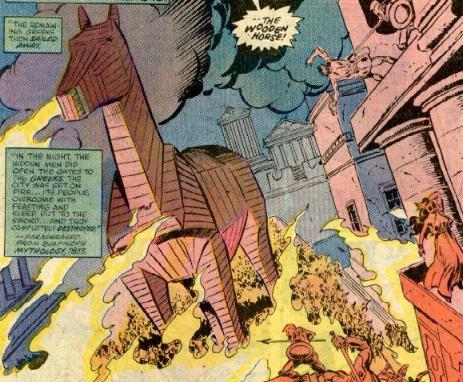
In an effort to avoid bloodshed, Odysseus represented Menelaus as they met with King Priam and beseech him to return Helen. Priam meanwhile had to honor Helen’s requests for asylum. Now unavoidable, Agamemnon let loose all the forces of ancient Greece upon the city to overtake it.
(Thor Annual#8)- The Asgardian gods Thor and Loki were sent back in time to the Trojan War by way of caverns under Asgard. Thor befriended Aeneas during a lull in the war and fought to protect him from the invading Greeks. Thor’s curiosity led him to encounter the Olympian gods and that they were manipulating the battle out of their own petty whims. Zeus yanked Thor out of the battle to keep him interfering with the war. He would have killed him had but a premonition of his future pact with Odin stopped him from following through with it. Loki, meanwhile, found a kindred spirit in Odysseus and inspired him to start construction on a Wooden Horse to use against the Trojans. Thor and Loki then returned the Twentieth Century as the Wooden Horse allowed the Greeks to conquer the city.
"What began with an apple must now end with a horse." Quote attributed to Odysseus, Homer’s Illiad.
(Thor Annual#17) - Traveling through time, Thor (Eric Masterson) passed through the final battle in Troy
Comments: Adapted by Roy Thomas, John Buscema and Tony DeZuniga.
Thanks to Dim I Nticoudis for his assistance.
The above lists mention basically the "prime-movers" of the war. A full list of all the warriors and commanders involved would take nearly a whole site itself.
The use of the name "Greeks" here is topical because the country of Greece would not technically exist until after the Ottoman Empire. Homer usually called the forces under Agamemnon as Achaeans, Danaans and Argives. The designation is somewhat better than the antagonistic "Greeks," but can prove misleading. All three designations represent different geographical regions and claims of decent. Another anachronism is that Thor and Aeneas seem to automatically share the same dialect, but then, maybe Thor’s godly attributes allow him to always comprehend and master the languages of mortals who speak to him. Also, the soldiers in the war are actually wearing the armor of the much later Roman Empire.
The traditional dates of the Trojan War have been determined to have occurred about 1193-1183 BC. When Heinrich Schliemann excavated the site in 1873, he uncovered nine layers of ruins on top of each other going back to 2300 BC. Homer’s Troy was finally identified with the third layer of ruins from the top.
Dim I Nticoudis adds about the implication of Discord, Venus and Aphrodite causing the War: "According to some ancient traditions all three of them were manipulated by Zeus. The old god reportedly was concerned with the growing population of demigods and considered them a potential threat to the Olympians. He proceeded in orchestrating the events of the Trojan War. Most of the demigods died either during the war or due to the long-reaching consequences of the war. Zeus' goal was then achieved."
"Other ancient traditions found the whole idea ridiculous and pointed that the demigods were far lesser than their divine parents and posed no threat to them. The ridiculousness of the idea was further pointed in the "Batrachomyomachia" (the Frog-Mouse War), an ancient Greek parody of the Iliad, which cast anthropomorphic mice in place of the Argives and anthropomorphic frogs in place of the Trojans. The surviving fragments have the gods being paranoid about the threat the miniscule warriors pose to them. A related work was another ancient parody "Margites" (Idiot). The hero of that name had all the fighting skill of the Trojan War's heroes but was virtually mindless, a kind of anti-Odysseus. As a result he was victim to all kinds of misadventures. Both works were considered hilarious during the Alexandrine and Roman periods but unfortunately scholars of the Middle Ages did not apparently agree and neglected to copy more than a few surviving fragments from them.
Hercules and the Argonauts also dealt with Troy accordingly on their return from Colchis with the Golden Fleece or on some later mission. While they were guests of King Laomedon, the father of Priam, Hercules rescued his daughter Hesione as a sacrifice to a sea serpent that had been ordered as a yearly sacrifice by the god Poseidon. When Laomedon refused Hercules’ wish to take her as a bride, the Argonauts sacked the city and placed Priam on the throne. Hesione and her sisters became wives to the Argonauts. Hesione gave birth to Teucer, son of Telamon, and her sister, Diomede, gave birth to Protesilaus, son of the Argonaut Iphiclus. As adults, both Teucer and Protesilaus returned to Troy as part of the soldiers who sailed against Troy. A prophecy warned that the first warrior to touch Trojan soil would be the first to die. Over eager to see the land of his ancestors, Protesilaus, however, leaped for shore first and was killed by his cousin Hector before he knew it.
Roy Thomas had promised to tell the story of Aeneas founding Rome in Thor Annual#9, but that story actually involved Loki and Dormammu. Furthermore, Avengers I#300 revealed that the Eternal Gilgamesh was present for the event.
Following the war, the surviving Trojans left behind buried their dead and tried to rebuild the city, but other tribes from Thrace conquered them and prevented the restoration of the city. Julius Caesar wanted the capital of the Roman Empire to be built at Troy, but Hera in her guise as Juno warned him that she would only allow the Roman Empire to exist if Troy was permitted to remain a ruin. Alexander the Great also visited the site and made a sacrifice there that permitted him to conquer Persia. Constantine, another Roman ruler, also considered making Troy a capital, but then later chose nearby Byzantium under the name Nova Roma. Today, it is known as the city of Constantinople (Actually, it's Istanbul...just like the song says!).
The book, Where Troy Once Stood, by Iman Wilkens paints a completely different layout of Europe in the 13th Century BC. He places Troy on the isle of Great Britain, Libya as encompassing much of Europe and Hades as an area in the Baltic Sea.
The Trojan War has become a popular story immortalized
in film; it has been most interestingly portrayed recently in the movie Helen
of Troy (2003) starring Sienna Guillory. In 1962, the Trojan Horse was released
with Steve Reeves and before that in 1955, Helen of Troy was released with
Brigitte Bardot. As of this writing, another version starring Brad Pitt as
Achilles is in production. Likewise, the Trojan War has been visited by
TV time travelers Tony Peterson and Doug Newman in The Time Tunnel TV Series
from the 1960s.
Per Degaton adds: I think Tyndar of the Ancachronauts
was also invovled with the Trojan War. Also, one of the Eternals per FF Unlimited#10.
Achilles, Aeneas, Helen and Odysseus receive their own entries in the Appendix. The rest of the characters receive entries here.
by Will U and Prime Eternal
CLARIFICATIONS:
The Trojan War is not to be confused with:
Agamemnon is not to be confused with:
Cassandra is not to be confused with:
Diomedes is not to be confused with:
Hector is not to be confused with:
Paris/Alexander is not to be confused with:
Philoctetes is not to be confused for:
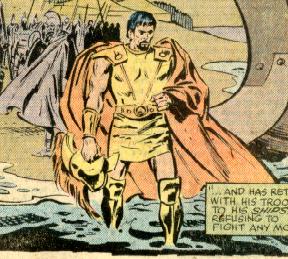
Agamemnon was the son of King Atreus of Mycenae and the grandson of King Pelops of Pisa and King Catreus of Crete. Inheriting the curse the gods levied on Atreus for the murders of his cousins, he and his brother Menelaus both lived in exile from Mycenae for much of their early years because of this curse up until he asked King Tyndareus of Sparta for the hand of his daughter Clytemnestra, the sister of Helen of Troy, in marriage. The desire was solely one to help him recover the throne of Mycenae, his father’s kingdom from King Tantalus, his nephew who was married to her. Slaying both Tantalus and his heir, he kept Clytemnestra as his wife, and came to rule Mycenae. He eventually saw a chance to seize the wealth of Troy after Paris abducted Helen from his brother.
Unable to sail for Troy because of a lack of winds to carry his ships, he learned from a prophecy that the goddess Artemis would not allow him to sail for Troy unless he sacrificed his own daughter Iphigeneia to her. The wind shifted to Troy as a result of the sacrifice and Agamemnon sailed for Troy (his daughter was reputedly restored to life by Artemis as her priestess to the Taurians or was secretly replaced by a deer by Artemis to test his determination). Once in Troy, Agamemnon seized a concubine named Briseis that Achilles had taken for himself in order to keep his mind in the war. Achilles, meanwhile, refused to pick up a sword for most of the war and only entered it after the death of his best friend, Patroclus. Angry over the disappearance of her daughter, Clytemnestra took a lover, Aegisthus, who claimed the throne of Mycenae on his behalf. When Agamemnon returned from war, the two of them joined forces to kill him out of revenge. Agamemnon’s ghost in the underworld presented himself to Odysseus in his visit there and told him of the details of his murder.
--Thor Annual#8
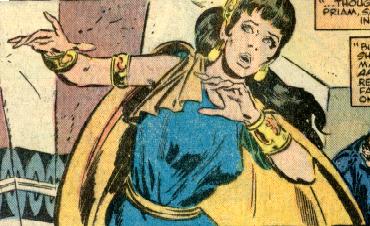
Cassandra was the daughter of King Priam of Troy and sister of Paris and Hector. She was loved by the god Apollo who gave her the gift of prophesy, but when she refused his further advances, he cast a field of doubt around her so that no one would believe her predictions. On the birth of her brother, Paris, she had a vision and realized his existence would spell disaster for Troy. She also recognized Paris when he returned to Troy as an adult after he was long thought dead. She also warned against bringing the Wooden Horse into Troy and that Agamemnon would take her as a slave who took her as she sought refuge in a temple of Athena. She would give birth to his sons Teledamus and Pelops. Before her death, her last prediction was that Aeneas would surmount disadvantages to found a great a great nation that surmount Troy and Mycenae together. Clytemnestra and Aegisthus murdered her along with her sons and Agamemnon.
--Thor Annual#8
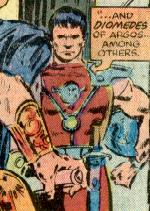
Diomedes was the son of Tydeus of the House of Argos. His father lost his life in an unsuccessful expedition to recover the throne of Thebes for his brother-in-law Polyneices. Diomedes avenged his father’s death in the war against Thebes by placing his cousin Thersander on the throne and his ally Andraemon on the throne of Calydon. He vied for the hand of Helen and stuck to an eternal vow to defend her marriage to Prince Menelaus of Mycenae. Diomedes and Thersander both achieved reputations as a duo in missions of sabotage, backstabbing and treachery but not much trust for each other.
During the Trojan War, he killed Lycian prince Pandarus and wounded Venus who demanded Ares to defend her honor. Confronting and surviving both Thor and Ares, he encountered Glaucus, the grandson of Bellerophon, a comrade of Andraemon’s father. Despite being on opposite sides, they became friends and they both conspired to kill Hector of Troy but Zeus prevented both of them from doing so. He helped to bring Philoctetes to the Trojan battlefield and was actually able to return home safely after the war. He lost the throne of Argos as his wife Aegialeia and her lovers plotted to kill him. He fled to Apulia in ancient Italy and married the daughter of King Daunus as a worthy successor to that throne. Venus meanwhile had cursed him for the wound he had inflicted on her. The results of the curse prevented him from lifting a sword alongside his brother-in-law Turnus against his old enemy, Aeneas.
--Thor Annual#8
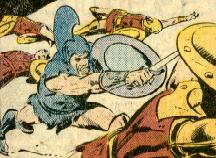
Hector was one of the fifty sons of King Priam of Troy. Heir to the throne, he was featured as courageous, mild-mannered, pious and responsible. A loving husband to his wife Andromache and father to his son Astyanax, he tried to convince his brother Paris to return Helen to spare Troy harm from the invading Greeks. When he refused, Hector took command of the Trojan Armies believing that the best omen was to protect the homeland. After an oracle predicted that whoever killed Achilles would die three days later, Hector volunteered to make that sacrifice to the war effort. He killed Patroclus to bring Achilles out of self-imposed hiding, but Achilles killed him first and dragged his corpse behind his chariot as a trophy. King Priam requested the bones of Hector in person for burial. His wife was taken as a concubine by Neoptolemus, the son of Achilles, but later married his brother Helenus. Hector’s bones subsequently were later removed from Troy and reburied in Thebes as a holy relic.
--Thor Annual#8
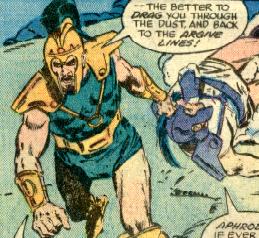
Menelaus was the son of King Atreus of Mycenae and the grandson of King Pelops of Pisa. Inheriting the curse imposed on the family of Atreus, his life was mostly overshadowed by his brother, Agamemnon, who used his marriage to Helen and the vow on his marriage to her to launch a war on Troy. In an effort to end the inevitable war early, Menelaus engaged Paris, the abductor of Helen, in personal combat to end the dispute, but Venus spirited Paris away to spare him. Smuggled into the city, Menelaus was almost able to reclaim Helen, but Venus had instructed Hermes to spirit her off to Egypt. Menelaus followed her there on the advice of Athena. While she was there, Helen drank a concoction that removed the horrible events of the war from her memory so that she would leave with her husband.
Finally returning to Sparta seven years after the death of his brother and a few hours after Orestes killed Clytemnestra and Aegisthus, Menelaus refused solace on his nephew Orestes for the murders. Orestes then took sword to slay Helen as revenge, but she was again spirited off by Venus for Olympus. Believing her to be dead, Menelaus attempted to avenge her, but was slain by Orestes who then seized his throne. Helen found everlasting life for him in Elysium.
--Thor Annual#8
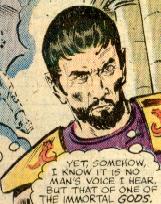
Pandarus was the son of King Lycaon of Lycia who led armies to Troy to help defend it from the Greeks. One of the best archers next to Paris, Pandarus was used by Athena to shoot an arrow at Menelaus during a ceasefire in order to keep the war from ending early. Pandarus rode with Aeneas on a mission to kill Diomedes, but was killed by him first.
--Thor Annual#8
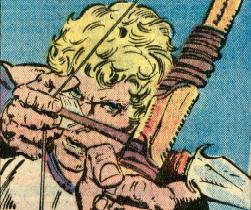
Paris was the youngest son of King Priam. His mother’s dream of giving birth to a firebrand was interpreted by priests that Paris would bring Troy to ruin. He was deserted on a mountaintop to die, but was found by a shepherd named Aegialeus who renamed him Alexander and raised him as his son. He chose Oenone, a minor mountain-goddess as his wife, but when Hermes chose Paris to decide on an owner of the golden apples, Venus promised Paris the hand of the most beautiful woman in the world. Paris only saw the face of Helen in a dream, but when he awoke, he learned that Trojan soldiers had stolen his adoptive father’s cattle. Heading to Troy to retrieve the cattle, he was recognized by his sister Cassandra and was welcomed back into the Royal Family of Troy as a result.
His brother, Hector, sent him to Mycenae to arbitrate good relations for Troy in hopes the Mycenaeans would kill him, but Paris instead discovered Helen and helped her to escape her loveless marriage for Troy while her husband was attending the funeral of a relative. He and Helen had three sons named Aganus, Bunomus and Idaeus, but they were all killed in the war. Paris proved to be a fine archer in the resulting war, but he was no warrior. Helen’s husband, Menelaus, met him in the battlefield to decide the victor of the war, but Venus rescued him from getting killed. She and the god Apollo both took credit for guiding Paris’s arrow in killing Achilles, but Paris was later mortally wounded by Philoctetes. As he died, he saw a vision of Oenone watching over him and he asked her to heal his wounds, but because of her broken heart, she instead turned down his request.
--Thor Annual#8
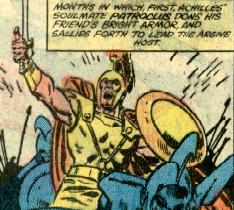
Patroclus was the son of the Argonaut Menoetius
and Sthenele, an abducted Trojan princess. He became friends with Achilles,
the son of his cousin Peleus, while they were students under the wise Centaur
Chiron. They were both suitors for Helen and as per the oath they made they
both honored it by going against Troy. After Achilles refused to fight after
being insulted by Agamemnon, he witnessed Trojans invading Greek ships and
asked Achilles if he could borrow his armor to attack the Greeks. In the
armor, he was mistaken for Achilles and killed by Hector of Troy. At first,
Achilles hesitated from giving him a funeral pyre, but Patroclus’ ghost appeared
to him to request it. Afterwards, Achilles asked the god Hephaestus for new
armor and wore it into battle to kill Hector and avenge Patroclus. His body
was burned on the same pyre and his ashes mixed with that of Patroclus.
Patroclus was later reicarnated in Olympus alongside other heroes of Earth to aid the gods against an invasion by the demons of Japan spearheaded by Mikaboshi.
--Thor Annual#8 (Ares#3, 5
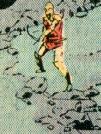
Philoctetes was the son of the Argonaut Poeas who was a close friend of Hercules. Hercules bestowed his arrows, which had been dipped in the blood of the Hydra, to Poeas as a reward for concealing his funeral. Philoctetes later inherited the arrows and took them with him to Troy, but while en route, he scratched himself with one of them. The stench of the wound became so bad that Odysseus, Agamemnon and Menelaus all agreed to abandon him on the island of Lemnos. Philoctetes developed a grudge against the three of them for removing him from the action. In the last days of the war, an oracle predicted that Troy would not be taken without the arrows of Hercules. Since cured by Machaon, the mortal son of the god Asclepius, Philoctetes was retrieved by Diomedes late in the war, but Diomedes also had to talk him out of killing Odysseus several times. Philoctetes soon signaled the end of the war by using an arrow to kill Paris.
He returned to Thessaly after the war as a hero, but was subsequently expelled for undetermined reasons. He traveled to Ancient Italy and founded the towns of Crimassa and Petelia before retiring in Campania. In the later years of his life, he built a shrine to Apollo and dedicated it with the keep the bow and arrows.
--Thor Annual#8
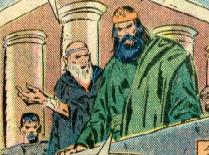
King Priam, real name Podarces, was the son and successor of King Laomedon. He was placed on the throne of Troy by the god Hercules because he was just a boy during his visit and unaccountable for the crimes his father and brothers had committed on the son of Zeus. As an adult, Priam increased the size of the city and its treasury and often defended the area on attacks by the Amazons, but he eventually became allies with them. He sired several heirs and children with Hecuba, a princess from Lydia, but was warned that his son Paris would ensure the destruction of the city. He had his soldiers expose the youth on the mountainside, but Paris was found by a shepherd named Aegialeius and raised to adulthood. Returning to Troy years later, Paris’s mother welcomed him back into the family.
When Paris abducted Helen and brought her to Troy, Priam had to grant her asylum as per custom. Priam’s son Hector was killed in the war that resulted and he had to request the return of his body for burial. He earned the respect of Achilles for his eloquence by comparing the young man to his father Peleus. As the Greeks stormed the city, Priam clung to a statue of Zeus for solace, but was killed by Neoptolemus, son of the deceased Achilles, who did not share the same honor for the Trojan king his father did. Years later when Neoptolemus’s descendant Alexander the Great wanted to conquer Persia, he made a sacrifice to Priam’s ghost to once more make peace with his family line for that transgression.
--Thor Annual#8
Images taken from:
Thor Annual#8, page 23, panel 1
Thor Annual#8, page 46, panel 2
Thor Annual#8, page 11, panel 2
Thor Annual#8, page 10, panel 3
Thor Annual#8, page 9, panel 3
Thor Annual#8, page 11, panel 1
Thor Annual#8, page 15, panel 6
Thor Annual#8, page 19, panel 5
Thor Annual#8, page 42, panel 6
Thor Annual#8, page 42, panel 3
Thor Annual#8, page 43, panel 2
Thor Annual#8, page 17, panel 2
Appearances:
Thor Annual#8 (1979) - Roy Thomas (writer/editor), John Buscema (pencils), Tony DeZuniga (inks)
Thor Annual#17 (1992) - Roy Thomas (writer), Geof Isherwood (pencils), Fred Fredericks (inks), Ralph Macchio (editor)
Ares#3, 5 (May, July, 2006) - Michael Avon Oeming (writer), Travel Foreman (penciler), Derek Fridolfs (inker), Warren Simons (editor)
First Posted: 03/14/2004
Last updated: 07/10/2006
Any Additions/Corrections? please let me know.
Non-Marvel Copyright
info
All other characters mentioned or pictured are ™ and © 1941-2099
Marvel Characters, Inc. All Rights Reserved. If you like this stuff, you
should check out the real thing!
Please visit The Marvel Official Site at: http://www.marvel.com
Special Thanks to www.g-mart.com for hosting the Appendix, Master List, etc.!